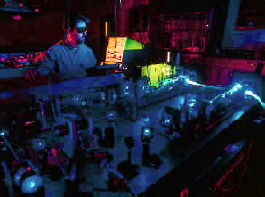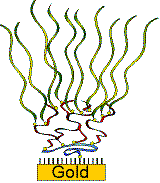 In the broadest sense, the area of analytical chemistry includes the theory and practice
of chemical separation, identification, and measurement. As such, it is a necessary
part of virtually every experimental chemist's work, regardless of his or her field.
For many of us, analytical chemistry is a field of specialization. At Michigan State
the subject of analytical chemistry goes far beyond the usual undergraduate analytical
course to include the complete analysis of chemical systems and processes. This analysis
is not limited to the determination of chemical composition, but includes the analysis
of the chemical interactions in equilibrium systems, determinations of structure,
reaction kinetics and mechanisms, the analysis of chemical system-measurement system
interactions, the analysis of measurement errors, and so forth. In other words, analytical
chemists seek the answers to the questions: "What is the most complete and accurate
description of the chemical system or process?"; "What is the most effective means
of obtaining the desired information about the system or process?"; and "What do the
measurements that are made to this end really mean?"
In the broadest sense, the area of analytical chemistry includes the theory and practice
of chemical separation, identification, and measurement. As such, it is a necessary
part of virtually every experimental chemist's work, regardless of his or her field.
For many of us, analytical chemistry is a field of specialization. At Michigan State
the subject of analytical chemistry goes far beyond the usual undergraduate analytical
course to include the complete analysis of chemical systems and processes. This analysis
is not limited to the determination of chemical composition, but includes the analysis
of the chemical interactions in equilibrium systems, determinations of structure,
reaction kinetics and mechanisms, the analysis of chemical system-measurement system
interactions, the analysis of measurement errors, and so forth. In other words, analytical
chemists seek the answers to the questions: "What is the most complete and accurate
description of the chemical system or process?"; "What is the most effective means
of obtaining the desired information about the system or process?"; and "What do the
measurements that are made to this end really mean?"
Many analytical chemists study chemical systems for their theoretical, industrial
or biological importance. Naturally, these people find much in common with physical
chemists, organic chemists, inorganic chemists, and biochemists. Still others who
concentrate on the problem of improving chemical measurements become deeply involved
in the optics, electronics, automation, and physical chemistry of measurement systems.
In short, it is a most satisfying area of chemistry for those of us who are intrigued
by the processes of experimentation and discovery.
 In an independent survey, the analytical program at Michigan State University was
rated as one of the very best in the country. Our faculty of internationally known
analytical chemists make a coordinated effort to maintain a vigorous and modern graduate
program. Key features of the program include a solid core of coursework in the context
of a flexible study and examination system, a broad spectrum of active research areas,
opportunities for research projects which combine aspects of analytical with other
areas of chemistry, excellent laboratory facilities and equipment, valuable teaching
experiences, and good financial support. These points are described in greater detail
in the Michigan State University Chemistry Department brochure.
In an independent survey, the analytical program at Michigan State University was
rated as one of the very best in the country. Our faculty of internationally known
analytical chemists make a coordinated effort to maintain a vigorous and modern graduate
program. Key features of the program include a solid core of coursework in the context
of a flexible study and examination system, a broad spectrum of active research areas,
opportunities for research projects which combine aspects of analytical with other
areas of chemistry, excellent laboratory facilities and equipment, valuable teaching
experiences, and good financial support. These points are described in greater detail
in the Michigan State University Chemistry Department brochure.
This combination of strengths has attracted a fine group of students to study analytical
chemistry at MSU. At present, there are 53 analytical graduate students. They have
obtained their bachelor degrees from colleges and universities of all sizes throughout
the United States and the World. A list of current students, their colleges and hometowns
is presented in a later section of this brochure. One indication of the quality of
this group is their fellowship record. Five of our present students hold departmental
Quill Fellowships. On the national scale, more of our students have won full-year
Analytical Division (ACS) Fellowships than any other department in the country.
For many years, academic and industrial openings for Ph.D. analytical chemists have
exceeded the supply. Potential employers have put Michigan State University high on
their list of sources for M.S. and Ph.D. analytical chemists. A selection of job opportunities
therefore awaits the well-trained analytical graduate.

